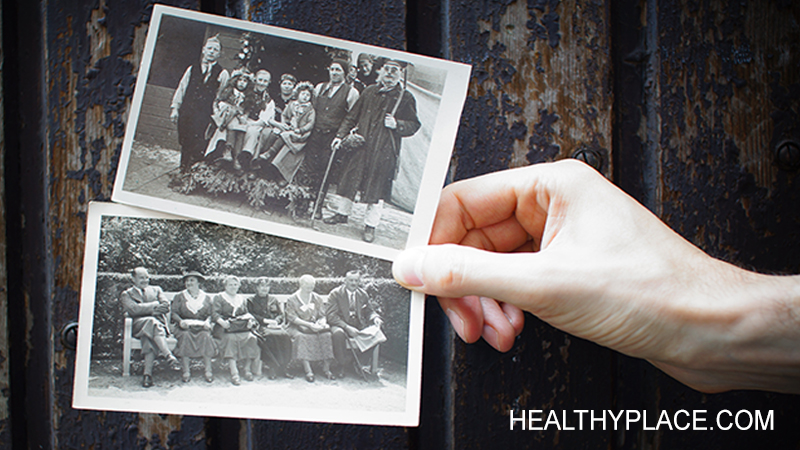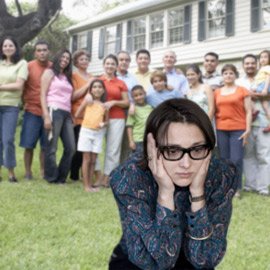Mental Health Relapse and Family During the Holidays

A family-related mental health relapse becomes more possible in the days approaching Halloween and the winter holiday season. You see, for those of us with mental illness, these holidays may be filled with dread rather than joy and anticipation. Likely, some of our issues with coping emanate from family situations, and we may experience triggers that can cause a mental health relapse when around our family. Many emotions can cause mental health relapse, particularly when experienced during a holiday period full of expectations and various personalities (Anatomy Of A Mental Health Relapse).
Family Guilt and Mental Health Relapse
I'm famous in my family for never calling my aunts. After my mom died about 20 years ago, I couldn't talk to any of her sisters without them wallowing in misery then bursting into tears. Sure, I understood their grief, but I was in college and had just lost my mother -- how about a little uplifting compassion?
Eventually, as I got older, my aunts developed a need for me to replace her in their lives: to communicate with them as often as she would, to alternately provide moral support and comic relief and who knows what else. Fair it isn’t, but you only get one family and 70-year-olds rarely change so I’d resigned to handle it by limiting my contact with my family in order to prevent mental health relapse (Setting Functional Boundaries).
To understand my choice, you must understand that my mother's sisters -- she had five, along with three brothers -- are guru-level guilt masters. They love to point out my behavior and say "Your mother would NEVER do that." or “You know what your mother would do in this situation." Years of practicing emotion regulation and cognitive behavior therapy have taught me that I’m not supposed to ruminate on these statements.
In my rational mind I can calmly think, "well, I'm not my mother and can never replace her,” and prepare to repeat this positive affirmation to my aunts. But during the holidays, when I’m already feeling loss and vulnerability, positive thoughts escape me in favor of the guilt that I place on myself for not being as giving and family-oriented as my mother.
When Family Doesn’t Understand Your Potential for Mental Health Relapse
 During the holidays with our families, we also have deal with our loved ones’ reaction to our disease. For me, this comes in the form of my cousin’s husband who doesn’t believe that there’s anything wrong with me. During a summer barbecue he proclaimed, in open conversation, that I -- who had to leave work in favor of three psych hospital stays -- wasn’t working because I was lazy. At another family gathering, this time at a restaurant, when another family member wanted to pay for my dinner, he refused: apparently my disability wasn't real, and there was no reason -- other than my own choice -- that I didn’t have any money. It was appropriate, by contrast, to pay for another cousin’s dinner because he’s in a wheelchair and has a “legitimate” disability. I should note that at no point in either situation did other family members stick up for me or understand my potential for mental illness relapse in such a hostile environment.
During the holidays with our families, we also have deal with our loved ones’ reaction to our disease. For me, this comes in the form of my cousin’s husband who doesn’t believe that there’s anything wrong with me. During a summer barbecue he proclaimed, in open conversation, that I -- who had to leave work in favor of three psych hospital stays -- wasn’t working because I was lazy. At another family gathering, this time at a restaurant, when another family member wanted to pay for my dinner, he refused: apparently my disability wasn't real, and there was no reason -- other than my own choice -- that I didn’t have any money. It was appropriate, by contrast, to pay for another cousin’s dinner because he’s in a wheelchair and has a “legitimate” disability. I should note that at no point in either situation did other family members stick up for me or understand my potential for mental illness relapse in such a hostile environment.
When someone seeks to delegitimize our disease and our experiences, it can be heartbreaking. When that person is a family member, it is doubly crushing. My rational mind has no process for this situation, other than to say that my cousin’s husband is an idiot, and that my cousin is an idiot for letting him speak to and about me in that way. But that’s not exactly rational. I haven’t seen or spoken to them in eight months, but it will be harder to maintain that distance during the holidays because my family is large and likes to get together.
Coping Strategies for Dealing with Family and Possible Mental Health Relapses
In anticipation of holiday get-togethers, I’m thinking about some tactics to limit my exposure to my cousin and her husband. Ignoring them works, but will be difficult if the family decides to have Christmas dinner at their house. But limiting my time with them doesn’t eliminate my periodic rumination over their comments. Maybe I am faking it? Maybe I am more recovered than I think and I’m just pretending to be depressed? I feel guilty for not working and needing help, which takes me down into my negative thoughts and depressed feelings and actions. Like staying in bed all day and rejecting social invitations, which increase my likelihood for a mental health relapse. But there are strategies to help get through the holidays with family, and now is a great time to start practicing them.
Find Tracey on Twitter, Facebook, Google+ and her personal blog.
APA Reference
Lloyd, T.
(2015, October 29). Mental Health Relapse and Family During the Holidays, HealthyPlace. Retrieved
on 2026, March 4 from https://www.healthyplace.com/blogs/relationshipsandmentalillness/2015/10/family-and-mental-healt-relapse-during-the-holidays
Author: Tracey Lloyd
Often people with mental health issues are at it alone. It is hard to talk to a 'normal' person about what you suffer from. A Person needs to go positively forward each day and for many days. Negativity Just drags you down. Pray and trust that those healing and better days are ahead. Finally I am starting to feel alittle better these days. Best wishes to you at the coming holidays and family gatherings.